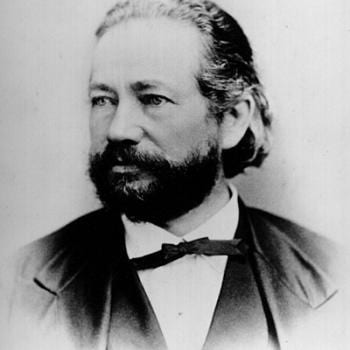
Though articles at TCC may comment on a range of topics (cultural, political, etc.) one of the stated goals of this column is to attempt to expand our understanding of the Reformed tradition through examining older sources. We will henceforth refer to such articles, this being the first, as Ad Fontes articles (which will always be tagged with that phrase). Today we look at a portion of Richard Baster’s (1615-1691) Christian Directory, or, A summ of practical theologie and cases of conscience directing Christians how to use their knowledge and faith, how to improve all helps and means, and to perform all duties, how to overcome temptations, and to escape or mortifie every sin : in four parts (1673), with a eye toward his discussion of both the sufficiency and insufficiency of Scripture.
The battle for the Bible was “won” years ago. But a host of commentators today will tell you that whereas the veracity and infallibility of Scripture (as a matter of principle) is now a non-debatable threshold issue, at least for conservative evangelicals, the question of Scriptures perspicuity and sufficiency have been incrementally and covertly undermined. This, in my estimation, is true. (Everyone should really read J. I. Packer’s Beyond the Battle for the Bible which presciently predicted these and some of the hermeneutical issues we’re now facing in conservative Protestant circles, a topic I’ve briefly discussed here). But it is also my contention that part of the ineptitude, thus far, in the evangelical response to diminishing confidence in, or reorientation of, the doctrines of Scriptural perspicuity and sufficiency is that they themselves possess a skewed version of the same. That is, regarding sufficiency in particular, the typical evangelical view of sufficiency (especially within certain “Reformed” circles) is overly expansive. And an expansive-ist doctrine of Scriptural sufficiency yields, among other things, a diminished confidence in Scripture’s perspicuity and ineligibility. This is, in part, because an expansive-ist sufficiency of Scripture forces the Scripture to do more than it actually does (and was intended to do by its supreme author and intermediate authors), which stretches its competency (in terms of what it addresses in breadth and kind of subject matter) beyond it proper bounds. Thus, Scripture, because to the predominate expansive-ist bent amongst some, is often exposed to unforced errors, so to speak, not because it has become fallible or actually convoluted and inconsistent, but because it has been made to apply (in a mechanical and direct way) to things to which it does not speak (or rather, presupposes the answer to and knowledge of). In short, the problem is user error, not Scriptural fallibility. One reason for the prevalence of this unforced error, from what I can tell, is a justified and admirable desire to practice fealty to Scriptural authority.
This desire is not misplaced but simply misapplied, or rather, predicated on false implications from allegiance to Scriptural authority. But a bare, hyper-Biblicism should never be desired. It was Biblicism that led the Socinians to deny the Trinity. But that’s what many evangelicals fall into. It is no wonder that, as James Dolezal discovered, so many American Chrsitians operate with a heretical view of God; many of the foundational assumptions of classical theism (read “historical orthodoxy”) are not immediately apparent from the Biblical text.
***
Richard Baxter helps us balance our hermeneutic by instructing us how to approach Scripture generally. Baxter penned the Directory in his later years (post-Restoration (1660)) when he was experiencing near constant badgering from the courts for practices related to his non-conformism (e.g. keeping conventicle, preaching without a license, etc.). His health took a turn for the worse during this period as well and he was confined to his home for extend portions of the last few decades of his life. But this period was also his most productive (even though some of his older works were burned by the authorities). The Directory is just one of the over 100 works, including a tender biography of his wife’s virtuous life, he produced during those wilderness years.
***
In Question 166 (of 204) of the Directory Baxter poses to himself, “Who be they that give too little to the Scripture, and who too much; and what is the danger of each extreme?”
The description of the first extreme is fairly predictable. People devalue Scripture when they, inter alia, 1) deny its inspiration and infallibility; 2) seek not the whole counsel of God (WCF 1.6) but, instead, pick and choose that which they will believe (think “Red Letter” Christians); 3) do not consider the Bible to be the “universal law and rule for all the world” (Baxter has in mind here those who would contextualize away certain portions as outdated and no longer applicable— “they that think it was adapted only to the time it was written in, and not our’s, as not foreseeing what would be.”); 4) those who believe some portions to be imperfect and in need of heavy supplement; 5) “they that think that it containeth not all that was necessary or fit for universal determination, of that kind of things which it doth at all universally determine”; and 6) those that don’t believe in its perspicuity, that is, those who think it was only written to the learned.
Baxter then considers, at greater length, the latter extreme, those who give “too much” to Scripture. What he means by that will become clear.
First, a mark of those who are mishandling Scripture by giving too much to it is excluding the “whole law and light of nature.” As Baxter explains elsewhere in the Directory, since grace does not destroy but perfects nature, perfect divine revelation is predicated on preexistent natural knowledge (much of which it reiterates, interprets, and completes). Scripture does not reinvent the epistemological wheel, as it were. The book of the creature (nature) and the book of Scripture are mutually supportive; knowledge of each is necessary to interpretation of each. Scripture repeats the natural law (e.g. the Decalogue) as condescension to man’s postlapsarian state but, to be clear, the natural law preceeds the law of Scripture. And the two share the same author and can, therefore, no ways contradict one another. Hence, Baxter’s condemnation of those who reject the use and validity of the light of nature (one half of the “whole law”). One cannot prize God’s revelation by discarding a portion of it at the outset. One cannot expect to understand Scripture if they pay no mind to the book of nature.
The old opinion that the Reformers and their progeny paid no mind to the western (Christian) natural law tradition has been, in my mind, sufficiently put to death. As John T. McNeill forcefully said in his well-known article, “Natural Law in the Teaching of the Reformers,” “There is no real discontinuity between the teaching of the Reformers and that of their predecessors with respect to natural law. Not one of the leaders of the Reformation assails the principle.” Affirmation of the natural law and natural theology generally is present throughout the Reformed confessions of the sixteenth and seventeenth centuries (as I’ve demonstrated before).
Wallace M. Marshall writes in his Puritanism and Natural Theology that “The overwhelming majority of Puritan theologians were firm believers in the legitimacy of natural theology and evidentialism,” and employed it in a variety of ways. As alluded to already,
[T]hey saw supernatural revelation as building on a foundation of natural revelation– natural revelation being conceived not merely as innate knowledge of God human beings have by virtue of being created in his image, but also in the sense of conclusions derived from reason, contemplation of human existence, and consideration of the works of nature.
Returning to Baxter’s point, all of this has implications for Scriptural interpretation. In their introduction to the republication of Neils Hemmingsen’s (1513-1600) On the Law of Nature: A Demonstrative Method, E. J. Hutchinson and Korey D. Maas, highlight not only Hemmingsen’s decidedly traditional association of the natural law’s basic precepts with the Decalogue but also his equally traditional prioritization of natural law “even over apparent biblical exempla.” The purpose and function of this position becomes clear when Hemmingsen deals with instances of polygamy in the Old Testament patriarchs, which he understands to be undeniably prohibited by nature. “[O]ne must judge not by examples but by the law of nature.”
***
A similar mistake to rejecting the relevance of the light of nature is the rejection of all extra (but not contra)-biblical knowledge (e.g. “grammars, logic, philosophy, and all other arts and sciences”), which Baxter evidently believes are helpful aids. Of course, he existed at a time when education, regardless of the profession intended, was general (what we would call “classical” now). The minister was expected to be learned in all ways, a process begun by training in languages (Latin, Greek, and Hebrew at minimum) and the works of antiquity. For a great overview of education and college life in Baxter’s day, see Samuel Eliot Morrison’s exhaustive (and, at times, exhausting) Harvard College in the Seventeenth Century (1936) (see also William T. Costello, The Scholastic Curriculum at Early Seventeenth Century Cambridge). The point is that general knowledge gleaned from all manner of arts and sciences was expected to be part of the minister’s tool box. This is especially true of history (Baxter favor Josephus and Eusebius in particular). Even a good understanding of politics was expected by Baxter, who once declared, “He that is ignorant of Politics and of the Law of Nature will be ignorant and erroneous in Divinity and sacred scripture.”
But Baxter’s approach to Scripture also reserves a place for church history and tradition, albeit a “subsidiary” use for the sake of not only proving the authority and trustworthiness of Scripture throughout the ages via the testimony of the church, but also as an interpretive help. (On this I recommend Craig Carter’s new Interpreting Scripture with the Great Tradition: Recovering the Genius of Premodern Exegesis (2018)).
That being said, Baxter does not advocate a purely mechanical reading of Scripture. Those afford to much to Scripture who do not sufficiently recognize the necessity of the Spirit’s illumination, not only in the text itself but in their lives (e.g. to combat the noetic effects of sin, etc.). Along the same lines, Baxter does not want to put the work of the Holy Spirit in a box. Although it is normative for the Spirit to work through the ordinary means of grace (unto sanctification) and through the Gospel preached (unto salvation), Baxter will not deny the legitimacy (and likelihood) of many coming to saving faith by “all the substantial parts of Christianity brough to him by tradition, parents, or preachers, who tell him nothing of the Scripture, but deliver him the doctrines as attested by miracles and the Spirit without any notice of the book.”
“[B]ooks of divinity” are also of supreme use to the Christian and are, of course, lawful to read. But those who esteem too highly Scripture will deny it. Baxter also insists that Christian recognize that all that is recorded in Scripture does not represent positive instruction or moral truth. Much of the text is history and not all of history’s actors behave righteously (e.g. “the devil’s words to Eve, of Job, to Christ”). Likewise, not every passage in Scripture is obligatory. Although Baxter warns against over-contextualizing the text, he also acknowledges that the principle or purpose of certain practices of the early church (e.g. greeting with a holy kiss) must be pursued rather than the practice itself.
Biblicists also typically deny the evident interpretive difficulty and even factual obscurity of certain passages. Baxter calls this too simplistic a hermeneutic, one that saves Christians form a healthy wrestling with the text in search of truth— a struggle that makes them prize the truth all the more.
“All these err in overdoing,” concludes Baxter. Now, as to the dangers of each extreme.
The first extreme (esteeming Scripture too little) 1) “injureth the Spirit who is the author of the Scriptures”; 2) “striketh at the foundation of our faith, buy weakening the records which are left us to believe”; and 3) “emboldeth men to sin, by diminishing the authority of God’s law; and weakenth our hopes, by weakening the promises.” But that’s not all, the first extreme also “shaketh the universal government of Christ, by shaking the authority or perfection of the laws by which he governeth,” and makes way for “human usurpations” as supplements to Christi’s authority and the Scriptures, leaving men to “contrive to amend God’s Word.” Lastly, and, perhaps, most egregiously, it hinders “the conviction and conversion of sinners, and hardeneth them in unbelief” because it calls into question the “means that should convince and turn them.”
The dangers of the second extreme (esteeming Scripture too much), the mistake of radical Biblicism, are arguably just as threatening. “It leadeth to downright infidelity,” says Baxter. “For when men find that the Scripture is imperfect or wanting in that which they [wrongly] fancy to be of its perfection, and to be really [i.e. actually] insufficient, e.g. to teach men physics, logic, medicine, languages, &c., they will be apt to say, ‘It is not of God, because it hath not that which it pretends to have.” Baxter’s argument is that an undue expectation of the scope and content of Scripture, and insistence (over and against the evident intent of the authors) that Scripture provide guidance not just on matters of faith and Christian living, but on a host of other topics, will lead to disappointment and disillusionment or bad interpretations (or both). If the Scripture, because of a bad view of its nature and inappropriate expectations as to its content, is found to be lacking then God becomes an author of imperfection. In short, Baxter would affirm the first part but deny the latter clause of Cornelius Van Til’s famous quote from Defense of the Faith (1955), “The Bible is authoritative on everything of which it speaks. Moreover, it speaks of everything.” Baxter would caution that this outlook could led to the dangerous just outlined. There is, indeed, much that Scripture does not speak to, that is, much that it is insufficient for.
***
Back in 2013, Carl Trueman stated, in no uncertain terms, that “The doctrine of the sufficiency of Scripture lies at the heart of what it means to be a Protestant.” And yet, he made went on to make clear that in order to rightly hold and defend this core commitment of Protestantism the doctrine must be accurately understood. He adds, “If my car breaks down or I am trying to work out who committed the crime in a particularly complex whodunit, I will not find the answer in the Bible. Nor will I find discussion of the human genome, the rules of cricket, or the wing markings of North American butterflies.” The Westminster Shorter Catechism (Q 3) helpfully and simply outline the scope and competency of Scripture:
Q. 3. What do the Scriptures principally teach?
A. The Scriptures principally teach, what man is to believe concerning God, and what duty God requires of man.
“In other words,” explains Trueman, “the Scriptures are sufficient for a specific task: they reveal who God is, who man is in relation to him, and how that relationship is to be articulated in terms of worship.” (emphasis mine). Pushing them beyond the purpose of their design leads to the extremes and errors discussed above by Baxter, and subsequently, a confused, unbalanced hermeneutic.
Thus, Trueman:
Given these factors, there is a sense in which we might say that Protestants believe in the insufficiency of Scripture: we acknowledge that Scripture is insufficient for many of the details of everyday life, such as motorcycle maintenance and cooking curries. It is even insufficient for the day-to-day running and good health of the church: we need elders, deacons and forms of sound words. What it is sufficient for, however, is for regulating the doctrinal content of the Christian faith and the life of the church at a principial level. That is Paul’s point in 2 Timothy 3:16. In other words, to speak of scriptural sufficiency is one way of speaking about the unique authority of Scripture in the life of the church and the believer as the authoritative and sufficient source for the principles of faith and practice.
Scripture pertains to, and is indispensable for, right (and especially saving) knowledge of God and His Son Jesus Christ, Christian practice, and church order and worship. The Westminster Confession of Faith (1646) reads,
The whole counsel of God concerning all things necessary for his own glory, man’s salvation, faith and life, is either expressly set down in Scripture, or by good and necessary consequence may be deduced from Scripture: unto which nothing at any time is to be added, whether by new revelations of the Spirit, or traditions of men. Nevertheless, we acknowledge…that there are some circumstances concerning the worship of God, and government of the church, common to human actions and societies, which are to be ordered by the light of nature, and Christian prudence, according to the general rules of the Word, which are always to be observed. (WCF 1:6)
T. David Gordon expertly discerned in an article for Modern Reformation that the key phrase in this portion of the WCF is “faith and life,” and that “life” must be taken in its religious sense, that of the Christian life. “I would clarify that the divines intended by “faith and life,” what one is to believe, and what one is to do, as a member of the New Covenant community.” There is, therefore, much that Scripture is insufficient for. A provocative statement, but true nonetheless, and, per Baxter, a statement necessary for a balanced, Christian heremeneutic.
Image Credit: @aaronburden/ Unsplash












